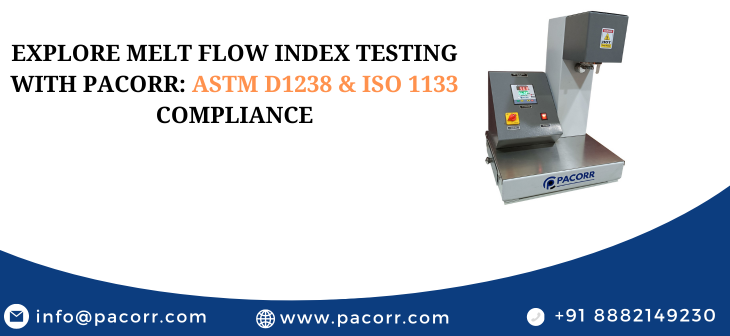
Pacorr stands as a beacon of quality, offering state-of-the-art testing instruments renowned for their precision and reliability. Among these, the Melt Flow Index (MFI) tester is pivotal in assessing the flow characteristics of thermoplastic polymers, ensuring compliance with ASTM D1238 and ISO 1133 standards. This deep dive into MFI testing will explore its critical role in material quality assurance and why Pacorr's instruments are the preferred choice among professionals.
Why Melt Flow Index (MFI) Testing Matters:
Melt flow index testing is a standardized method used to measure the flow rates of melted plastics. This testing is crucial because it directly reflects the material's molecular structure and its processing behaviors, which are vital for determining suitability in various applications. For manufacturers, understanding the MFI of their material means they can predict how it will behave in the production phase, ensuring consistency and quality in the final product.
Understanding the Standards: ASTM D1238 and ISO 1133:
MFI testing is governed by two primary standards: ASTM D1238 and ISO 1133. Both set the parameters for conducting the tests, ensuring uniformity across testing procedures globally. ASTM D1238 is primarily used in the United States, while ISO 1133 is recognized internationally. Each standard outlines the method to measure the rate of extrusion of molten resins through a die of specified length and diameter under prescribed conditions of temperature, load, and piston position in the barrel.
Pacorr's MFI Testers: Precision at Its Best:
Pacorr's melt flow index testers are engineered with precision, adhering to both ASTM D1238 and ISO 1133 standards. These instruments are designed for ease of use and robust performance, making them suitable for a wide range of industrial applications. Features include digital displays for accurate readings, automated cut-off mechanisms, and user-friendly interfaces, ensuring that even the most subtle variations in testing conditions can be accurately captured and analyzed.
Step-by-Step Process of Melt Flow Index Testing:
- Preparation of the Material: The plastic samples are pre-conditioned and cleaned to remove any contaminants that might affect the results.
- Heating the Material: The samples are heated to a specified temperature to reach a molten state, with temperatures typically ranging between 190°C to 280°C, depending on the material.
- Loading the Material: The molten plastic is loaded into the barrel of the MFI tester.
- Applying the Load: A specified weight is applied to the piston, which presses the molten plastic through the die.
- Collecting Extrudate: The extruded plastic is cut at a predefined mark, and its weight is measured to calculate the melt flow rate.
Applications and Importance of MFI in Industry:
The results from MFI testing are critical in several ways. They help in:
- Quality Control: Ensuring batch-to-batch consistency in production.
- Material Selection: Choosing the right material for specific applications based on flow properties.
- Research and Development: Developing new polymer grades with desired characteristics.
- Regulatory Compliance: Meeting industry standards and specifications.
Melt flow index testing, facilitated by instruments from Pacorr, is an indispensable part of the plastics industry. By providing a detailed measure of material flow properties, Pacorr’s MFI testers play a pivotal role in enhancing product reliability and efficiency. For any manufacturer keen on delivering products that meet the highest standards of quality and consistency, investing in accurate testing solutions like those offered by Pacorr is not just beneficial—it’s essential.
By ensuring compliance with both ASTM D1238 and ISO 1133 standards, Pacorr helps manufacturers around the world maintain the highest quality in their plastic products, proving that when it comes to precision and reliability, their instruments are unmatched. Whether you’re in quality control, R&D, or production, understanding and implementing effective MFI testing is key to success in the competitive landscape of plastic manufacturing.

